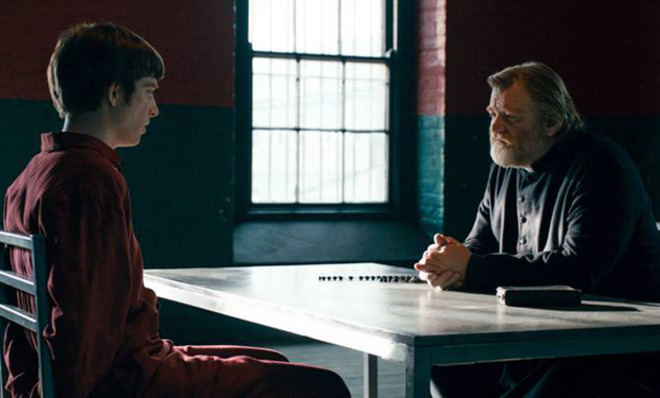Calvary is the latest step in film noir's long evolution
The genre has chewed up and spit out hard-boiled protagonists for decades — but the latest iteration brings its dark themes into the modern day


A free daily email with the biggest news stories of the day – and the best features from TheWeek.com
You are now subscribed
Your newsletter sign-up was successful
A friendly-looking priest is in a confessional booth when he receives an unsettling message from the other side of the screen: "I'm going to kill you, Father."
This is the opening scene from Calvary, the new pitch-black drama from Irish writer/director John Michael McDonagh. On the surface, the film is a moral and religious reckoning for its hero — and by extension, Ireland's revered institutions. But Calvary also plays on a different level — as a classic film noir whodunit. But this time, the hero isn't a hard-boiled detective; he's a Catholic priest.
Brendan Gleeson plays Father James, the good-natured priest who finds out that he's going to die. There is a quasi-mystery over who, exactly, confesses to the impending murder; Father James says he has some idea who it is, but chooses not to tell anyone, including the police. But despite this deviation from a standard mystery, McDonagh peppers the film with important hallmarks of the genre. Father James knows everyone in the town, like a detective or private investigator might, and he's in a unique position to know all their secrets.
The Week
Escape your echo chamber. Get the facts behind the news, plus analysis from multiple perspectives.

Sign up for The Week's Free Newsletters
From our morning news briefing to a weekly Good News Newsletter, get the best of The Week delivered directly to your inbox.
From our morning news briefing to a weekly Good News Newsletter, get the best of The Week delivered directly to your inbox.
Film noir, which was influenced heavily by hard-boiled detective novels and the dramatic cinematography of silent German filmmakers, had its heyday in the wake of World War II. The noir stories are about detectives, men like Philip Marlowe and Sam Spade who wander into the depths of human ugliness with every case.
Detective-driven noir is still a hallmark of the genre. In the 1970s, Jack Nicholson and Elliott Gould played detectives in Chinatown and The Long Goodbye, respectively. The Academy-Award winning L.A. Confidential in 1997 offered dueling detective protagonists. HBO's True Detective wouldn't exist without the timeless appeal of a cynical man who discovers the nasty truth about the world around him at great personal cost.
But while the detective story will always have its place, the noir hero has evolved to reflect his era. By the time Alan J. Pakula made The Parallax View and All the President's Men in the 1970s, the journalist had been established as a noir hero. A journalist was a more serviceable hero for the post-Watergate era of paranoia: a crusader who would fight to uncover the truth, even if the bad guy was never actually punished for it.
After the popularity of films like Presumed Innocent, the 1990s saw several examples of lawyers stuck in noir: The Firm and The Client, with more recent offerings like The Lincoln Lawyer and Michael Clayton serving as throwbacks. Befitting the era, it was massive corporations that turned out to be the bad guys — and this time, they were punished for it.
A free daily email with the biggest news stories of the day – and the best features from TheWeek.com
No villain is punished in Calvary, which has an entirely different target. Indeed, the confessor plans to kill Father James specifically because he's a good man. "There'd be no point in killing a bad priest," he explains. "But killing a good one...that'd be a shock."
If Father James is a good man, he is only modestly so. He listens and empathizes, while keeping judgments to himself. Noir heroes try in vain to fix the world around them; Father James has literally devoted his life to guiding the townsfolk toward goodness, one nudge at a time.
The grimmest irony of Calvary is that Father James is mostly unsuccessful. The people in the parish mock the priest and the institution he represents, becoming avatars for a cynical, modern skepticism of religion. In this respect, Calvary's target is more than Catholicism or Ireland — it's society writ large.
More importantly, the man who plans to kill Father James has a specific, disturbing motive — one that serves as a symbol of how the church has often turned away from the helpless innocents who needed the most help. It's a striking way to take a genre so rooted in the past and make it feel new again.
Whether a hero succumbs to his base nature or fails against a corrupt institution, all noir is about the hard fight against evil — and the victories are never wholly complete. At first, Father James accepts his eventual slaying as a form of martyrdom. But by the time the end of the week rolls around, he has become a kind of ultimate noir hero: the kind who realizes that his death, no matter what form it takes, can have little meaning.
It's an arc that places Calvary as the latest evolution of film noir, raising the important and troubling questions of our own era — and suggesting the impossibility of resolving them satisfactorily.
Alan is the film editor of Brightest Young Things and a freelance arts writer based in Washington, D.C. He has written about film for The Atlantic, RogerEbert.Com, The Washington City Paper, and IndieWire.
-
 Why is the Trump administration talking about ‘Western civilization’?
Why is the Trump administration talking about ‘Western civilization’?Talking Points Rubio says Europe, US bonded by religion and ancestry
-
 Quentin Deranque: a student’s death energizes the French far right
Quentin Deranque: a student’s death energizes the French far rightIN THE SPOTLIGHT Reactions to the violent killing of an ultra-conservative activist offer a glimpse at the culture wars roiling France ahead of next year’s elections.
-
 Secured vs. unsecured loans: how do they differ and which is better?
Secured vs. unsecured loans: how do they differ and which is better?the explainer They are distinguished by the level of risk and the inclusion of collateral
